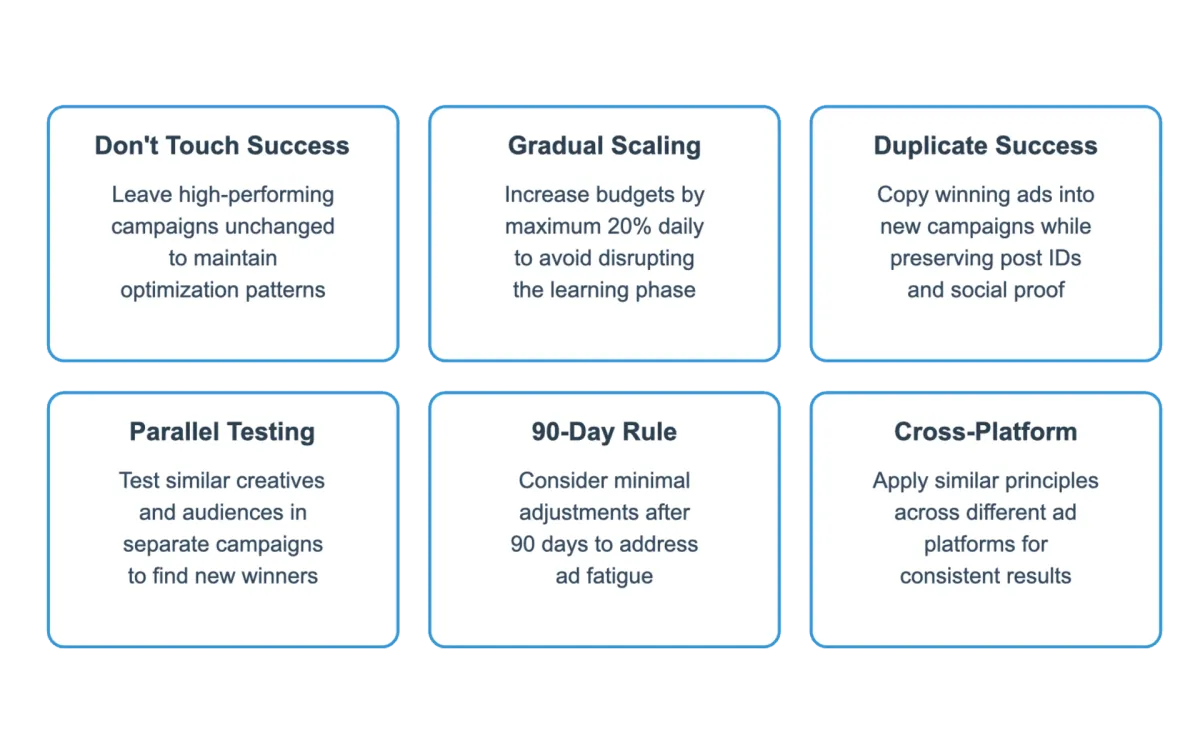
In a discussion among digital marketing professionals on LinkedIn this January, advertising specialists have highlighted how restraint in campaign management leads to better performance outcomes. The conversation, initiated by performance marketing expert Jakub Szunyogh, has garnered attention from over 139 marketing professionals who shared their experiences with Meta's advertising platform.
According to Alexandra Dent, a Digital Marketing Specialist, rapid budget increases can destabilize campaign performance. "Our ads tanked when we increased the budget by 45% at once," Dent stated, emphasizing how aggressive modifications disrupted the campaign's effectiveness. This experience aligns with the platform's technical requirements for maintaining campaign stability.
The marketing professionals outlined a structured approach to scaling successful campaigns. According to Hrushikesh Landge, a systematic budget increase of approximately 20% daily helps prevent triggering Meta's review mechanisms or learning phase - a critical period when the platform's algorithm optimizes ad delivery.
AJ Sonnick, Chief Marketing Officer and digital strategist, introduced a temporal component to campaign management. "After the 90-day mark, minimal changes might be necessary to address ad fatigue," Sonnick noted, suggesting that by this point, successful campaigns should already have been replicated in new campaign structures.
The discussion revealed technical insights into Meta's algorithm behavior. Marketing professionals emphasized that the platform's performance optimization relies heavily on consistent data patterns. Sudden changes in campaign parameters can disrupt these patterns, forcing the algorithm to readjust its learning process.
Brazilian media specialist Camilla Brandao drew parallels to sports strategy, noting that successful teams maintain their winning lineup. This analogy resonated with other professionals who observed similar principles across different advertising platforms, including Google Ads.
The marketing specialists identified three critical components for maintaining campaign effectiveness:
- Campaign replication instead of modification, where successful ads are copied into new campaigns rather than altered
- Gradual budget scaling, typically not exceeding 20% daily increases
- Parallel testing of similar creative elements to identify additional successful variations
Performance Marketing Manager Hassan Ahmed noted that this principle extends beyond Meta's platform, suggesting it represents a fundamental aspect of digital advertising optimization across various channels.
The discussion highlighted how Meta's algorithm requires stability to optimize ad delivery effectively. According to Ali Haider, an advertising consultant, duplicating winning advertisements into new campaigns while gradually increasing budgets helps minimize risks during scaling phases.
Several participants shared experiences of campaign deterioration following hasty modifications. Folasikemi B., a digital marketer, described how expanding target audiences in a successful campaign led to immediate performance decline, demonstrating the sensitivity of optimization parameters.
Sadman Shahadat, a web analytics leader, emphasized the importance of maintaining social proof when duplicating successful advertisements, specifically mentioning the technical necessity of preserving post IDs during campaign replication.
The conversation among these marketing professionals revealed a shift away from frequent campaign adjustments toward a more measured approach to optimization. This methodology prioritizes stability and gradual scaling over rapid modifications, reflecting a deeper understanding of how advertising algorithms operate.
The insights shared by these digital marketing specialists suggest that successful campaign management requires patience and restraint, contrasting with more aggressive optimization strategies. This approach acknowledges the complexity of digital advertising algorithms and their need for consistent data patterns to maintain performance levels.
According to Edis Babahmetović, who specializes in omni-channel advertising, success often comes from working both horizontally and vertically at the campaign and ad set levels, while minimizing changes to individual advertisements.
These insights from marketing professionals indicate that digital advertising success increasingly depends on understanding and working with algorithmic learning patterns rather than frequent manual interventions. This represents a significant shift in campaign management methodology, emphasizing the importance of strategic patience in digital advertising optimization.

